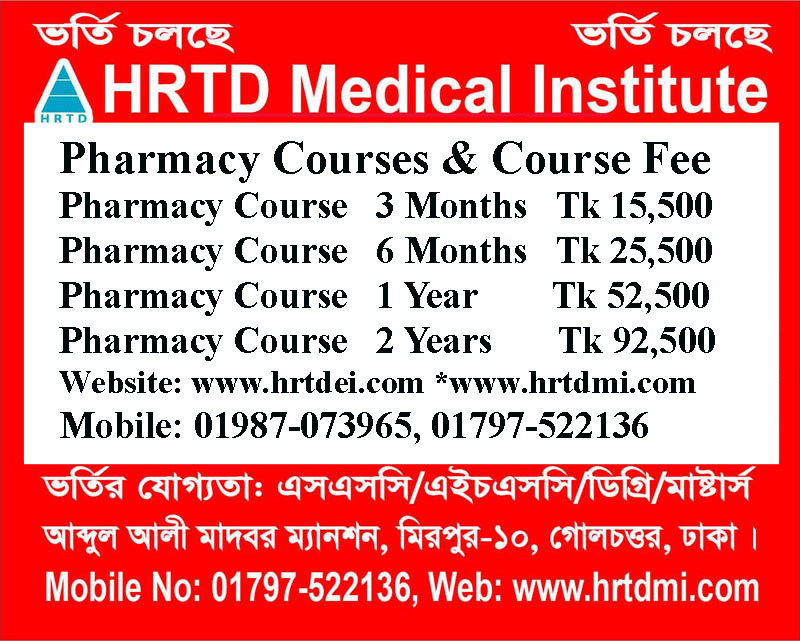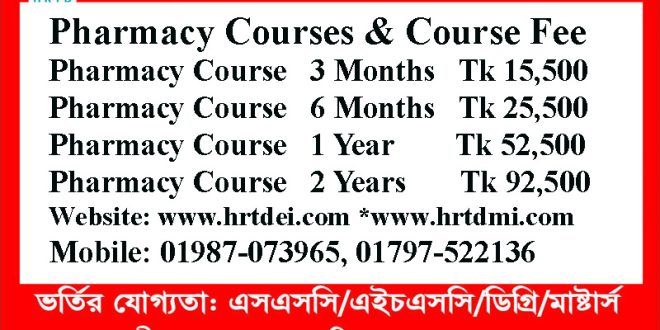Pharmacy Course profile details:

Best Pharmacy Courses: Diploma Pharmacy Couse 1 Year, 2 Years, Mobile No. 01941-123488. 3 Years, and 4 Years. DPhC means Diploma in Pharmacy Couse. DPhC 1-Year Course Fee Tk 62500. Total Subjects 10, Total Semester 2, Total Exam Marks 1000. DPhC 2-Years Course Fee Tk 102500. Total Subjects 18, Total Semester 4, Total Exam Mars 1800. DPhC 3-Years Course Fee Tk 142500.
Total Subjects 24, Total Semester 6, Total Exam Marks 2400. DPhC 4-Years Course Fee Tk 182500. Total Subjects 30, Total Semester 8. Total Exam Marks 3000.
Location of Pharmacy Courses
Location of Pharmacy Courses: HRTD Medical Institute, Abdul Ali Madbor Mansion, Section-6, Road-1, Plot-11, Metro Rail Piller No. 249, Mirpur-10 Golchattar, Dhaka-1216. Mobile Phone Number 01797522136, 01987073965, Hotline Number 01969947171.
Subjects for Pharmacy Courses
(1 Year 10 Subjects, 2 Years 18 Subjects, 3 Years 24 Subjects, and 4 Years 30 Subjects
Human Anatomy & Physiology
Pharmacology-1
First Aid
Study of OTC Drugs
Pharmacology-2
Study of Antidiabetic Drugs
Study of Cardiovascular Drugs
General Chemistry for medical Study
Biochemistry for Medical Study
Hematology & Pathology
General Pathology
Systemic Pathology
Study of Gastrointestinal Drugs
Study of Respiratory Drugs
Microbiology & Antimicrobial Drugs
Study of Antimicrobial Drugs
Medical Diagnosis-1
Medical Diagnosis-2
Study of Hormonal Drugs
Study of Neurological Drugs
Study of Ophthalmic & ENT Drugs
Study of Gynecological Drugs
Study of Psychiatric Drugs
Study of Dermatological Drugs
Drug Rules Regulations
Study of Pediatric Drugs
Study of International OTC Drugs
Study of Essential Drugs
Study of Emergency Drugs
Other Diploma Pharmacy Courses are DPhA 2-Years, DPhA means Diploma in Pharmacy Assistant. DPhA 2-Years Course Fee Tk 92500, Total Subjects 18 in 2 semesters. Total Exam Marks 1800.
What is the study of pharmacy?
The Pharmacy Courses are the science and practice of preparing and dispensing drugs and medicines to help prevent, diagnose, and treat diseases and conditions. It involves research into the composition, preparation, and dosage of medications, as well as the therapeutic effects and safety of drugs. Pharmacy graduates may also pursue careers in clinical pharmacy, drug manufacturing, and health care policy.
Pharmacists are responsible for ensuring the accuracy and effectiveness of medications and informing patients of potential side effects and interactions. They also advise doctors and other health care providers on the best medications for their patients, and advise patients on how to use their medications safely and effectively. Pharmacists also work with insurance companies to ensure that medications are covered and that patients receive the best possible care. If you want to complete our Pharmacy Courses from HRTD Medical Institute please, contact with us.
In order to become a pharmacist, individuals must graduate from an accredited pharmacy school and pass a national licensing exam. Pharmacists must also complete continuing education courses throughout their careers to stay up to date on new medications and advances in the field. Pharmacy students must also understand how drugs interact with other medications and the body, as well as the legal and ethical issues surrounding the practice of pharmacy. If you want to complete our Pharmacy Courses from HRTD Medical Institute please, contact with us.
The study of pharmacy is an important part of the health care field, and pharmacists play an essential role in helping patients get the best possible care. Pharmacists provide valuable advice and expertise to both patients and health care professionals, and their knowledge and expertise is vital in ensuring that medications are prescribed and used safely and effectively. If you want to complete our Pharmacy Courses from HRTD Medical Institute please, contact with us.
Teachers for Pharmacy Courses
Dr. Amina Afroze Anu, MBBS
Dr. Sakulur Rahman, MBBS
Dr. Sanjana, BDS
Dr. Keya, BDS
Dr. Shamima, MBBS
Dr. Tisha, MBBS, PGT
Dr. Disha, MBBS, PGT
Kanij Fatema, B Pharm
Eti Zahan, BSc Nurse
Dr. Farhana, MBBS
Study of Orthopedic Drugs
Orthopedic Drugs are that used for the treatment in Orthopedic Diseases. The field uses a wide variety of medications for various conditions, including non-steroidal anti-inflammatory drugs (NSAIDs), corticosteroids, disease-modifying antirheumatic drugs (DMARDs), muscle relaxants, and more. The specific drugs used depend on the patient’s condition, the severity of their pain, and other factors.
How can I get pharmacy certificate in Bangladesh?
Getting a pharmacy certificate in Bangladesh is not an easy process, but it is possible. In order to become a certified pharmacist in Bangladesh, one must first complete a four-year bachelor’s degree in pharmacy from an accredited university. After completing the degree, the student must then pass a two-part national pharmacy examination. If you want to complete our Pharmacy Courses from HRTD Medical Institute please, contact with us.
After successfully passing the pharmacy examination, the student must then complete a two-year internship program. During the internship, the student will be trained in various aspects of pharmacy practice, including dispensing, compounding, and counseling. After completing the internship, the student must then pass the Bangladesh Pharmacy Council’s final examination. If you want to complete our Pharmacy Courses from HRTD Medical Institute please, contact with us.
After successfully passing the examination, the student will receive a certificate of pharmacy. This certificate is valid for three years and must be renewed on a yearly basis. Upon renewal, the student must complete a number of continuing education courses in order to maintain their certification.
In addition to completing their degree, internship, and examination requirements, the student must also have a valid license from the Bangladesh Pharmacy Council. This license must be renewed on a yearly basis and is issued only after successful completion of the national pharmacy examination.
Once the student has successfully completed all of the necessary requirements for becoming a certified pharmacist in Bangladesh, they can then apply for a job in the field. Pharmacists can work in hospitals, pharmacies, pharmaceutical companies, or even in research facilities.
In conclusion, becoming a certified pharmacist in Bangladesh is not an easy process. However, it is possible and with hard work and dedication, it can be done. Once the student has completed their degree, internship, and examination requirements and obtained a valid license from the Bangladesh Pharmacy Council, they can then apply for a job in the field and start their career as a pharmacist.
 HRTD Medical Institute
HRTD Medical Institute






Very interesting subject, thanks for posting